|
NiBiRu: Age of Secrets
|
| Sam: | Thus far, all of our tag-team reviews have been of games we enjoyed, on balance; NooBooRoo broke the trend gloriously, and only the hope of tearing it to shreds sustained us after about, oh, the first fifteen minutes of game play. |
| Jacq: | Well, the first five minutes of that was cut scene, to be fair.
And... I don't know. Now that we're done, I think the game had a certain charm. Some games are fun because they're bad. And even after playing it, I'm not sure if it wasn't all intentional (ala Eye of the Kraken). |
| Sam: | You probably think that Pol Pot was just a big kidder, too. |
| Jacq: | Point taken, darling. |
| Sam: | Anyway, Nibaroo will take you on a whirlwind voyage of ancient secrets, dark conspiracy and thrilling action, from Old Prague to the jungles of the Yucatan, all brough to you by the Wernicke's Aphasia School of Acting. |
| Jacq: | Anyone foolish enough to take the game's spanky, flash-encrusted website at face value would think it was the adventure of a lifetime, starring a protagonist filled with intuition, intrigue, and ingenuity. |
| Sam: | Sadly, the reader would do better to draw his conclusions from Martin's vacant expression than from his tarted-up resumé. |
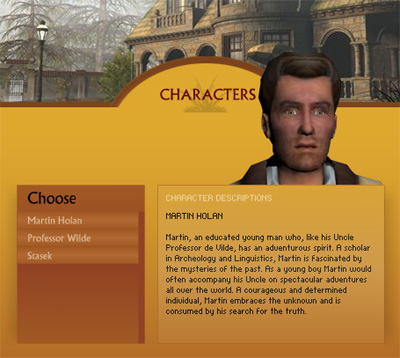
|
| Jacq: | Oh, come on. Everyone puts a bit of polish on their resumé. But... yeah... I don't know where to start on this guy. |
| Sam: | How about his wooden acting? |
| Jacq: | Ah... an excellent suggestion. This is the biggest strike against him, to be sure.
Within the first fifteen or so minutes of gameplay, we were treated to Martin's sensitive side, when, upon discovering a gruesome murder, he pretty much seemed unmoved by the presence of the corpse and could instead only really focus on the deceased's cat. |

|
| Sam: | I would applaud the graphic adventure industry's support of autistic characters, except that I couldn't in good conscience call this a positive portrayal of, well, anyone. |
| Jacq: | Aw. You're being a bit harsh, don't you think? Poor Martin is always being picked on... |

|
| Sam: | Martin's emotional range is approximately that of a bathroom cabinet, and his dedication to the cause of archaeology makes the Dr. Jones 'Grab The Shiniest Artefact And Run Out Before Everything Explodes' approach look like the peak of academic respectability. He engages in theft, fraud, setting off fire alarms, breaking and entering, looting and vandalism of archaeological sites, assisting looters and animal cruelty... although he does demonstrate indignation when offered alcohol. (Well, it'd be indignation if he was capable of expressing any sort of attitude at all.) |
 Martin and Bill W. go waaay back.
Martin and Bill W. go waaay back.
|
| Jacq: | To be fair, Martin has to stay in top form in order to save the day. No drunkard could possibly hope to match Martin's deep insight... |

|
| Jacq: | Let's not forget his complete unwillingness to exert any energy when asked to do so. Even when we figured out that we didn't have to wait for him to walk from room to room to room (double clicking on an exit provided a nice fade-to-black segue to the next location), we still had to endure his sloth.
The man refused to run anywhere (a nice touch found in other games). Thirty-five NPCs to talk to... and half the time Martin has to sloooowly walk allll the way across the room, only to face that NPC and think to himself, "I have nothing whatsoever to discuss with this person."
Hell, he's even too lazy to take the stairs. |
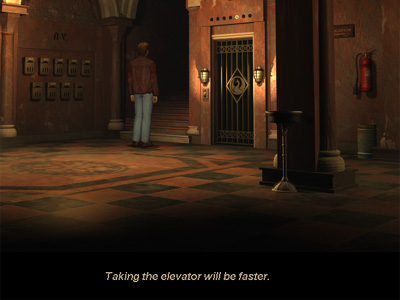
|
| Sam: | And to be frank, there aren't really any stronger characters. Truly, Nibbyroo paints a picture of a dark world, a world where humans are two-dimensional, loveless clichés only defined by their functional demands and their atrocious accents, where it is always a struggle to find anything to say and awkward silences abound. A world where it is always raining... in your SOUL. |
 It's worth noting that the closest Martin gets to a love interest
winds up in a bathtub with slashed wrists before they ever meet in
person, and that this probably represents a good move on her part.
It's worth noting that the closest Martin gets to a love interest
winds up in a bathtub with slashed wrists before they ever meet in
person, and that this probably represents a good move on her part.
|
| Jacq: | Fortunately, the game develops Martin on a more complete level than the NPCs, allowing us valuable insight into how Martin works, to let us understand what drives him. Martin's thoughts are subtitled in italics, as we can see below - a compelling insight into the mind of a true genius. |
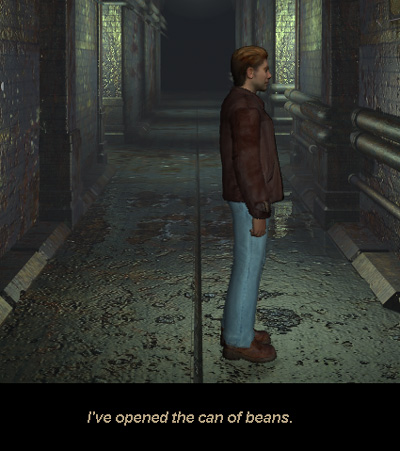
|
| Sam: | The crowning glory of Martin's lignified character is the voice acting, a performance as devoid of genuine emotional content as the most Botox-enhanced of America's news anchors. |
| Jacq: | In their defense, I'll take an opportunity to point out that the game was, I strongly suspect, originally released in the Czech Republic, and that all the flat acting and atrocious accents you hear might not have been the vision of the authors. |
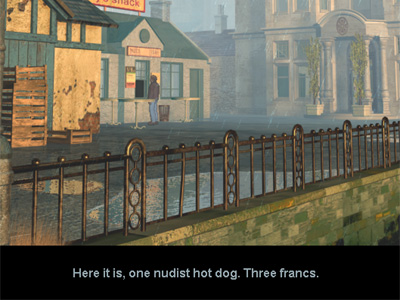 One wonders if this was intentional, or just poor translation.
One wonders if this was intentional, or just poor translation.
|
| Jacq: | But, on the very fair flip-side of that coin, the US release was done under Dreamcatcher Interactive's Adventure Company division, and they should have known better. |
| Sam: | The dreadful dialogue would have been excusable if we hadn't had to sit through long cutscenes involving little else, or (better still) through non-existent cutscenes where things fade to black, Martin explains what happened, and then lights go up again without any need to program anything that'd show us. |
| Jacq: | Five chapters, thirty-five non-player characters, and fifty pages of dialogue - sometimes being over-ambitious results in just boring the hell out of your audience. |
| Sam: | I rather suspect that those fifty pages were double-spaced with extra-wide margins. |
| Jacq: | Well, regardless, the best lines of the game come not from discussions with other characters, but from Martin's aforementioned inner dialogue.
A few more examples... |
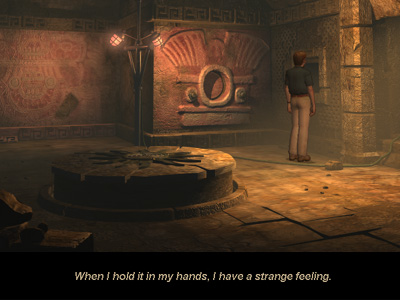
|
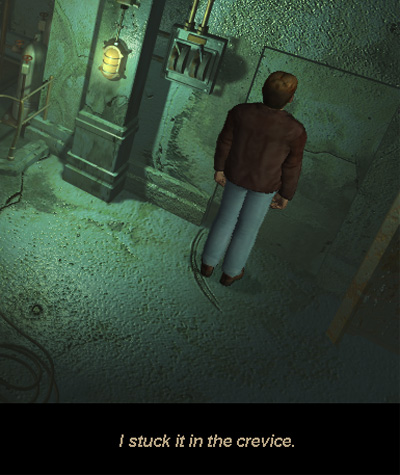
|
| Jacq: | One notable exception, as at least some of the conversation gets... interesting. |

|
| Jacq: | The jokes, as they say, practically write themselves. |
| Sam: | Moving swiftly on. The plot of Nibberew follows the basic dramatic principle that vague rumours and conspiracy theories are always right, and that any archaeology-based adventure must always end up uncovering mystic secrets man was not meant to know. Fuck, for once I'd like to see an action-adventure-archaeology work in which the hero eventually confirms a footnote in the leading work on the urnfield culture, earning the respect of the academic community. Or one in which a daring, rugged archaeology student full of promise joins forces with a wildcat female mercenary to uncover the truth about Phoenician-Incan contact with the alien-inspired monolith builders of Atlantis, only to be exposed as a complete fraud, stripped of his PhD and reduced to a bitter existence of self-publication and cheap whiskey. |
| Jacq: | Since I actually did graduate work in archaeology, I can say two things. First, that a graphic adventure in which you watch the PC sift dirt looking for minute stone flakes or bits of broken pottery probably wouldn't sell in quite the same way Indiana Jones does (though it'd be a damn sight more exciting than this game), and second, that archaeology actually is a bitter existence of publication and cheap whiskey. |
| Sam: | Another thing. Whereas in real life, any machine more complicated than an atl-atl requires hours of work by bizarrely specialised enthusiasts to reproduce in even approximately workable form, in Magical Archaeology Adventureland the Ineffable Wisdom of the Ancients always ensures that any machine - any machine - will always operate flawlessly, given a quick brushing-off an maybe a drop or two of oil. And the old alien technology excuse doesn't work when it also applies to the (non-alien-enhanced) Nazi bunker. What's the life-expectancy of an abandoned diesel generator, exactly? |
| Jacq: | I couldn't say, but I didn't have much trouble getting one to fire up in this game.
And while bits of the Nazi war-machine may have needed a drop or two of oil, how about those secret Mayan doors and recessed staircases and such? While most of the game's puzzles centered on find-the-hotspot pixel hunting, inane scavenger hunts, or merely clicking on the railroaded plot triggers in the proper order, I sure was happy to see some of those pretty, colorful, ancient puzzles left behind by the aliens to keep us out of the Mayan pyramids. |
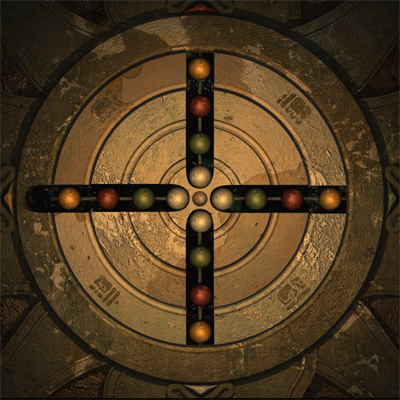
|
| Sam: | Proof, were it needed, that the ancient Central American, Egyptian, Chinese and Atlantean civilisations were in communication with each other, and exchanged the mysterious alien technology of matching coloured balls in sets of three or more. |
| Jacq: | As tired as the genre may be, all the games you just linked to are great.
But while I'm thinking of it, you really need to lay off reading so much Von Daniken, dear. |
| Sam: | I'm not sure about great exactly, but since you've just spent several days playing Nabbyrabby you're entitled to a bit of skewed perspective.
Anyway. I suspect that betatesters got tired of the interminable expostulation scenes, because apart from one rather terse journal and a couple of cryptic encounters with an Indian shaman, there's not really a great deal to explain what Project Roobanoob was, what the twelfth planet is, what the aliens got up to and why it's important that we, um, do something somehow to influence all this; I suppose that this is a mercy of sorts, as it spared us an awful lot of uninspired cutscenes, but it leaves the game off on a big vague anticlimax. |
| Jacq: | Um... I didn't feel we were "spared." We were assaulted by quite a few cut scenes... but you're right in that most of them didn't explain much. Most of them were just about how the dock worker needs us to help him unload the cargo, or why we should go buy wine for a retired security guard, or why we need to guy buy food for a crazy old Cockney beggar who somehow ended up in Paris. |
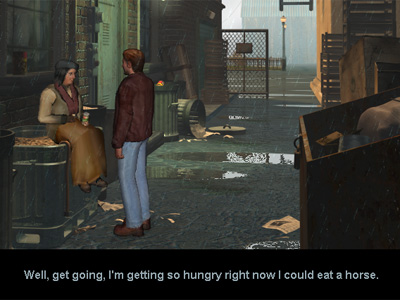 Fortunately for her, this part of the game is set in France.
Fortunately for her, this part of the game is set in France.
|
| Jacq: | 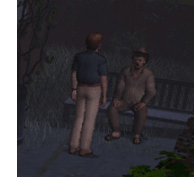 I think, though, that at some point the authors became fully aware of their evil doings. I shall quote Martin, who, while in Mexico, speaking to a belligerent drunkard who was passed out on a park bench until we splashed water from the nearby fountain on his face as part of a puzzle about trying to meet some guy named George who was drinking inside a nearby elite establishment: I think, though, that at some point the authors became fully aware of their evil doings. I shall quote Martin, who, while in Mexico, speaking to a belligerent drunkard who was passed out on a park bench until we splashed water from the nearby fountain on his face as part of a puzzle about trying to meet some guy named George who was drinking inside a nearby elite establishment:I need to get inside the pub, but the bouncer won't let me in until I bring a girl called Isabella, who in turn can't go out because her mother won't let her until I fetch the money you don't have. Got it? |
| Sam: | Drunk, Drunk! Bite rat. Rat won't carry dynamite, dynamite won't kill Nazi, Nazi won't go over the Mayan alien-contact site stile, and I shan't get home tonight.. |
| Jacq: | Heh. But the Drunk wouldn't. And so we had to catch the rat ourselves and strap some dynamite to its back. |
 Seriously.
Seriously.
|
| Sam: | And the illogical mechanics only start there. 'Arbitrary' is too cultured a word for the clusterfuck puzzle-justification the game throws at you, although it's not so much throwing as projectile defecation.
Objects vanish mysteriously from your inventory once they've outlived their use. Hotspots disappear and reappear as triggered events dictate, and a standard solution is "let's go and look at every available location to see if that made anything happen," although often the game will make this easier by making locations unavailable for no particular reason. |
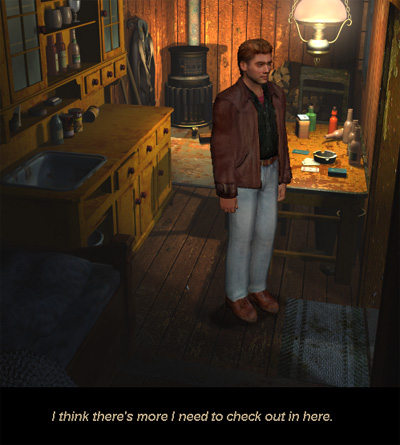
|
| Jacq: | Yes. While I hate red herrings as much as the next adventurer, I hate railroading even more. At several poins in the game, you can't leave a room or general area until you've found everything you came for. In an effort to prevent the game from being made unwinnable, they reduce it to tediousness. I think I'd much rather have a somewhat forgiving game that can, on occasion, be made unwinnable - as the Grand Inquisitor so wisely said, "Save often. Floss regularly."
It would also be nice to see objects that you might never use, and items that stay in your inventory or are otherwise available throughout the game - particularly when one object might have many uses and the authors have anticipated multiple solutions to puzzles. |
| Sam: | Multiple solutions are a distant, utopian myth. Nooby-Doo doesn't so much railroad you as tie you to the tracks, nail a train schedule to your forehead and then claim that you're the 4.25 to Wolverhampton. |
| Jacq: | Maga, you may not realize it, but the railroading was an intentional feature of the game. Take a moment, if you will, to read this honest response when Zděnek Houb, one of the authors, was interviewed by GameZone: GZ: Can you choose your own path, or decide what Martin will say, creating a unique experience for multiple play-throughs? Are there multiple endings to be seen? (It's fine if you can't answer this one, we just like to provide our readers with as much detail as possible.)
ZH: The story of NIBIRU was combined since the very beginning as a film story, i.e. as a linear one. Of course, there can be many ends of NIBIRU, but we did not want to deprive the players of their fantasies about what is in fact behind the whole story, whether the mythical visitors from the space really exist etc. The player will learn only what happened here on the Earth. But what is behind the whole story outside the boarders of our world is the imagination of the player. So there, you see? He didn't want to limit our feeble little imaginations from dreaming! |
| Sam: | We are also expected to use our imaginations whenever Martin manipulates an object, gesturing in empty air like an out-of-work mime. A good example: he'd walk up to a pillar, wave his hands around vaguely, walk over to a window, raise one hand and then a rope would spontaneously appear, tied between pillar and window! He's a man of many talents. |
| Jacq: | Martin can't take all the credit. He has magic pants, otherwise known in the industry (or at least our previous reviews) as Bottomless Booty Trousers. Allow me to share with you a short, non-inclusive list of some of the woundrous things we saw emerge from Martin's pants:A tool chest
A pipe wrench
A crow bar
A walking stick
Hot dogs, with condiments
Several buckets full of water
A flask filled with battery acid
A broom with a chemical-soaked rag on the end
The aforementioned dynamite-carrying rodent(alive and "agressive") |
 So many tempting things can be found in Martin's magic pants.
So many tempting things can be found in Martin's magic pants.
|
| Jacq: | I think we're coming pretty close to wrapping this up, so I'd like to take an opportunity to say that the game wasn't all bad.
The soundtrack was at worst inoffensive, but generally added to the mood.
Ambient atmospheric effects, while perhaps used a little too liberally, were usually quite well done - though at the beginning of the game the ambient noise of a river flowing beneath a bridge drowned out all the dialogue (sorry for the pun) and we went scrambling for the subtitles... but that did result in better screenshots for our review, though, as you can see. |
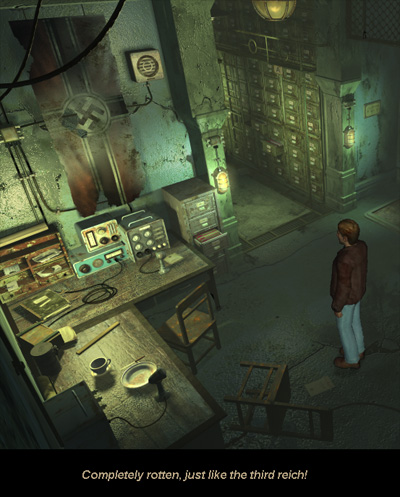
|
| Jacq: | Settings were where the game wins. Every room, every outdoor location was crafted with obvious attention to detail. |
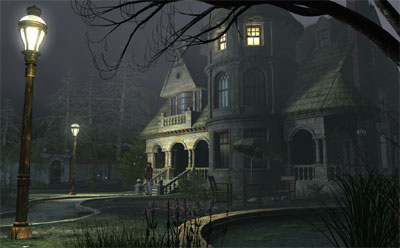
|
| Jacq: | And the Zděnek Houb quote from earlier is actually quite telling - I think the linear aspect of the plot has a lot to do with the fact that the authors thought of the game in terms of "film." Camera angles and pans were used, but not to excess. |
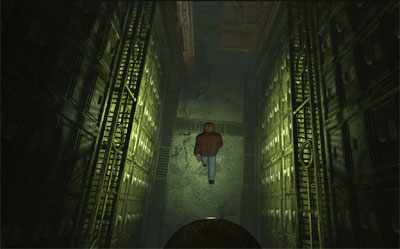
|
| Sam: | I wasn't as impressed; graphic adventures have a very high bar for prettiness, and there weren't really any visual moments that made me sit back and whistle in appreciation. The environments in Xanaxdu were generally decent, but were spoiled by the expressionless stiff who kept walking through them. |
| Jacq: | I was just trying to be nice. |
| Sam: | I'm sure that's, um, very charitable of you, dear. But we must not show weakness in the face of such atrocity. |





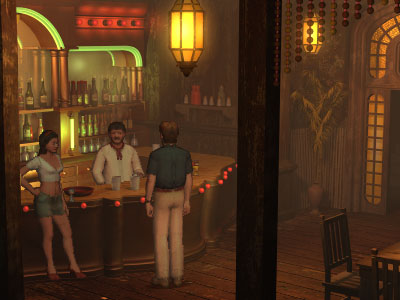 That's right. A snarky review.
...
That's right. A snarky review.
...



 Martin and Bill W. go waaay back.
Martin and Bill W. go waaay back.

 It's worth noting that the closest Martin gets to a love interest
winds up in a bathtub with slashed wrists before they ever meet in
person, and that this probably represents a good move on her part.
It's worth noting that the closest Martin gets to a love interest
winds up in a bathtub with slashed wrists before they ever meet in
person, and that this probably represents a good move on her part.

 One wonders if this was intentional, or just poor translation.
One wonders if this was intentional, or just poor translation.




 Fortunately for her, this part of the game is set in France.
Fortunately for her, this part of the game is set in France.
 I think, though, that at some point the authors became fully aware of their evil doings. I shall quote Martin, who, while in Mexico, speaking to a belligerent drunkard who was passed out on a park bench until we splashed water from the nearby fountain on his face as part of a puzzle about trying to meet some guy named George who was drinking inside a nearby elite establishment:
I think, though, that at some point the authors became fully aware of their evil doings. I shall quote Martin, who, while in Mexico, speaking to a belligerent drunkard who was passed out on a park bench until we splashed water from the nearby fountain on his face as part of a puzzle about trying to meet some guy named George who was drinking inside a nearby elite establishment: Seriously.
Seriously.

 So many tempting things can be found in Martin's magic pants.
So many tempting things can be found in Martin's magic pants.



